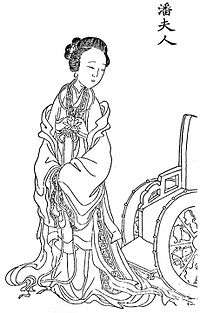Pan Shu
Empress Pan (died 252), personal name Pan Shu,[1] was an empress of the state of Eastern Wu during the Three Kingdoms period of China. She was the only empress of Wu's founding emperor, Sun Quan, even though he had a succession of wives before her. She was the mother of Sun Liang, Sun Quan's successor and the second emperor of Wu.
| Pan Shu 潘淑 | |
|---|---|
 A Qing dynasty illustration of Empress Pan | |
| Empress of Eastern Wu | |
| Tenure | June or July 251 – 252 |
| Successor | Quan Huijie |
| Born | Unknown Ningbo, Zhejiang |
| Died | 252 Nanjing, Jiangsu |
| Burial | |
| Spouse | Sun Quan |
| Issue | Sun Liang |
Life
Lady Pan was from Gouzhang County (句章縣; within present-day Ningbo) in Kuaiji Commandery. Her personal name was not recorded in her biography in the Records of the Three Kingdoms (Sanguozhi), the authoritative source of the history of the Three Kingdoms period. However, the Jiankang Shilu mentioned that her personal name was "Shu", hence she was also known as "Pan Shu".[1] Her father, who served as a low-ranking official, was executed for committing an offence whose details are not recorded. Both Lady Pan and her elder sister were forced to become servants and assigned to the royal textile factory. Once, Sun Quan encountered her and felt that she was extraordinary so he took her as his concubine.
The historical treatise Shi Yi Ji mentioned that Lady Pan was known as the most beautiful woman in Jiangdong. When she was still working in the textile factory, she was alienated and called goddess by people who worked with her. After Sun Quan heard about this story, he ordered the painter to draw Lady Pan's portrait. Although Lady Pan looked glum in the portrait, Sun Quan was shocked because of her beauty and exclaimed:"She is a goddess,indeed. Her sadness is so attractive, let alone her smile." In the palace, Lady Pan was becoming increasingly favoured by Sun Quan so that he built a palace called Liuhuantai (榴環臺) for her, which means the palace of pomegranate and ring.[2]
In 243, while Lady Pan was pregnant, she dreamt of receiving a dragon head and gave birth to Sun Liang later. In 250, in the aftermath of a succession struggle between Sun Quan's sons Sun He and Sun Ba, Sun Liang was designated as the crown prince by his father. In 251, Sun Quan instated Lady Pan as the empress. Empress Pan was known for being charming but jealous as she never ceased slandering and harming Sun Quan's other wives until her death.[3]
Death
When Sun Quan became seriously ill in 252, Empress Pan asked Sun Hong (孫弘), the Prefect of the Palace Writers (中書令), about how Empress Lü seized power after the death of her husband (Emperor Gao of the Han Dynasty). However, she herself also fell sick due to the stress of continuously attending to Sun Quan. She was ultimately murdered when she was in a coma, but how she was murdered remains a controversy. Wu officials claimed that her servants, unable to stand her temper, strangled her while she was asleep and claimed her death was of natural causes; while a number of historians, including Hu Sanxing, the commentator to Sima Guang's Zizhi Tongjian, believed that top Wu officials were complicit, as they feared that she would seize power as empress dowager after Sun Quan's death. Investigation into her death resulted in the executions of 6-7 people. Sun Quan died soon after in the same year. Empress Pan was buried together with Sun Quan at the Jiang Mausoleum (蔣陵; at the Purple Mountain, Nanjing, Jiangsu).[4] The historian Hu Sanxing commented in his annotations to the Zizhi Tongjian that the murder of Empress Pan was probably a conspiracy by top officials in Eastern Wu because they feared that she would seize power after Sun Quan's death.[5]
Family
In 250, Lady Pan requested Sun Quan to emancipate her elder sister from slavery and arrange a marriage for her sister and he agreed. Lady Pan's sister later married Tan Shao (譚紹). When Sun Liang became the new emperor, he commissioned his uncle as a Cavalry Commandant (騎都尉). After Sun Liang was demoted to a prince under Sun Chen's persecution. Tan Shao also lost his official position and was sent back to Luling, the hometown of him with his family.[6]
References
- (皇后潘氏暴崩于内宫。后諱淑,會稽句章人,后自織室召入。) Jiankang Shilu vol. 2.
- (吳主潘夫人,父坐法,夫人輸入織室,容態少儔,為江東絕色。同幽者百餘人,謂夫人為神女,敬而遠之。有司聞於吳主,使圖其容貌。夫人憂戚不食,减瘦改形。工人寫其真狀以進,吳主見而喜悅,以虎魄如意撫按即折。嗟曰:“此神女也,愁貌尚能惑人,况在歡樂!”乃命雕輪就織室,納於後宮,果以姿色見寵。每以夫人遊昭宣之臺,志意幸愜,既盡酣醉,唾於玉壺中,使侍婢瀉於台下,得火齊指環,即掛石榴枝上,因其處起臺,名曰環榴臺。時有諫者雲:“今吳、蜀爭雄,‘還劉’之名,將為妖矣!”權乃翻其名曰榴環臺。又與夫人遊釣台,得大魚。王大喜,夫人曰:“昔聞泣魚,今乃為喜,有喜必憂,以為深戒!”至於末年,漸相譖毀,稍見離退。時人謂“夫人知幾其神”。釣台基今尚存焉。)Shi Yi Ji vol. 8.
- (吳主權潘夫人,會稽句章人也。父為吏,坐法死。夫人與姊俱輸織室,權見而異之,召充後宮。得幸有娠,夢有似龍頭授己者,己以蔽膝受之,遂生孫亮。赤烏十三年,亮立為太子,請出嫁夫人之姊,權聽許之。明年,立夫人為皇后。性險妬容媚,自始至卒,譖害袁夫人等甚衆。) Sanguozhi vol. 50.
- (權不豫,夫人使問中書令孫弘呂后專制故事。侍疾疲勞,因以羸疾,諸宮人伺其昏卧,共縊殺之,託言中惡。後事泄,坐死者六七人。權尋薨,合葬蔣陵。) Sanguozhi vol. 50.
- (吳潘后性剛戾,吳主疾病,後使人問孫弘以呂后稱制故事。左右不勝其虐,勝,音升。伺其昏睡縊殺之,託言中惡,縊,於賜翻,又於計翻。中惡,暴病而死也。中,竹八翻。後事泄,坐死者六七人。斯事也,實吳用事之臣所爲也。潘后欲求稱制,左右小人正當相與從臾爲之,安有不勝其虐而縊殺之之理!吳史緣飾,後人遂因而書之雲爾。孟子曰:盡信書,不如無書。誠哉!) Zizhi Tongjian (annotated version) vol. 75.
- (孫亮即位,以夫人姊婿譚紹為騎都尉,授兵。亮廢,紹與家屬送本部廬陵。) Sanguozhi vol. 50.
- Chen, Shou (3rd century). Records of the Three Kingdoms (Sanguozhi).
- Hu, Sanxing (13th century). Annotations to the Zizhi Tongjian.
- Sima, Guang (1084). Zizhi Tongjian.
- Xu, Song (c. 8th century). Jiankang Shilu (建康實錄).
| Chinese royalty | ||
|---|---|---|
| New dynasty | Empress of Eastern Wu 251–252 |
Succeeded by Empress Quan |
| Preceded by Empress Cao Jie of Eastern Han Dynasty |
Empress of China (Southeastern) 251–252 | |